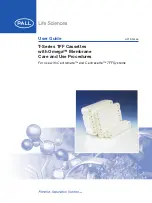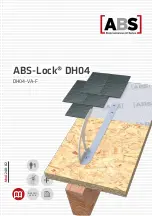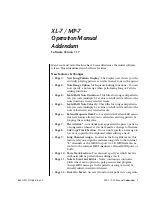
Decommissioning
MTS Landmark™ Tabletop Load Units - Product Information
123
Decommissioning
Decommission the System
The decommissioning process is performed when the system is going to be moved or taken out of
service. Dis-assembly is required when performing either of these tasks.
1. Remove the specimen and fixtures. Large grips should be removed if the load frame is going
to be tipped over.
2. Move the actuator piston rod down to its lowest position, fully into the cushion.
3. If the unit has hydraulic lifts, move the crosshead to its lowest position and torque the manual
crosshead locking bolts. However, if the unit is going to be moved, the crosshead might need
to be locked at a higher position to accommodate moving the unit.
If the unit has manual locks, select a crosshead position that will accommodate moving the unit
and torque the manual locking bolts.
4. If there are hydraulic grips on the unit, ensure that the hydraulic pressure is relieved from the
grip and release ports and hoses on both grips.
On large grips, position the wedge chambers to the lowest positions, similar to the unit’s piston
rod as noted above.
If the unit has a remote Series 685 Grip Supply, cycle the grip/release handles while reducing
the pressure setting to release all pressure from the grips and hoses. Turn off the Series 685
grip control and disconnect electrical power. Remove the hoses.
If the unit has an integrated grip control (Series 318 and MTS Landmark) on the frame control
panel, move the grip/release handle to the null position and release the pressure using the
pressure release valves on the grip manifold under the control panel.
5. Turn off the HSM.
6. Turn off the HPU or shut off valves if the unit is connected to a hard line distribution system.
Allow time for pressure to bleed off before closing the return shut off valve.
7. Remove the accumulator charging pressure from all accumulators.
8. Hydraulic locks can retain stored pressure. Manually bleed them if the unit is going to be
stored or disassembled.
9. Close the hydraulic supply valve or control and then isolate the system hydraulically.
Depending on your system’s configuration, there is either a manual valve that must be moved
to its Off position or an electronically controlled supply valve that must be turned off.
Electronically controlled valves are either turned off using local controls or the system software
interface controls.
10. Isolate the system from electrical power.
After the system electronics, control software, and the system PC are powered down, turn off
the system’s main electrical supply and disconnect all cables.














































